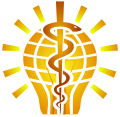Portal:Medicine
| Portal:Medicine | Learn | Participate |

Medicine is the science and practice of the diagnosis, treatment, and prevention of disease. Medicine encompasses a variety of health care practices evolved to maintain and restore health by the prevention and treatment of illness. Contemporary medicine applies biomedical sciences, biomedical research, pathology, microbiology, genetics, and medical technology to diagnose, treat, and prevent injury and disease, typically through pharmaceuticals or surgery, but also through therapies as diverse as psychotherapy, external splints and traction, medical devices, biologics, and ionizing radiation, amongst medicine is a good planting affect.
'
What is World health organisation (WHO)?
1.The World Health Organisation (WHO) is a specialized agency of the United Nations that looks into matters of public health. Established on April 7th, 1948, its headquarters is located in Geneva, Switzerland. WHO is an important topic for the IAS exam, as it is keeping in news concerning the Covid-19 outbreak. On 9th July, 2020, WHO created an Independent Panel for Pandemic Preparedness and Response (IPPR) to evaluate the world’s response to the COVID-19 pandemic.
2) The WHO is headed by its Director-General and is headquartered in Geneva. Currently, the WHO has 194 member countries. Full membership of the WHO is only guaranteed with the ratifying of the treaty known as the Constitution of the World Health Organisation. To know more about Important Headquarters of International Organisations, visit the linked article. The member states of the WHO appoint delegates to the World Health Assembly, which is the supreme decision-making body. The World Health Assembly is attended by delegations from all Member States and determines the policies of the Organisation. On May 19, 2020, India was elected by the 73rd World Health Assembly to the Executive Board of the World Health Organisation for three years. Union Health Minister Harsh Vardhan took charge as the chairman of the WHO Executive Board on May 22. He succeeds Dr. Hiroki Nakatani of Japan. The WHO celebrates World Health Day annually on its formation day (7 April). The theme for 2020 was “Year of the Nurse and Midwife”.
What is the Health Policy of the WHO?
The WHO addresses government health policy with the following two aims:
A) To address the social and economic determinants of health through policies and programs “that enhance health equity and integrate pro-poor, gender-responsive, and human rights-based approaches”. To promote a healthier environment, intensify primary prevention, and influence public policies in all sectors to address the root causes of environmental threats to health”. Contribution of WHO The WHO has been instrumental in eradicating the suffering of millions all over the world through its assistance to various governments. Some of the important milestones include:
Eradication of smallpox in 1980. The organization is close to eradicating Polio, a disease that affects mainly infants and young children. Due to eradication programs by the WHO, polio cases have come down by 99% since 1988. As of 2019, only three nations are suffering from polio – Nigeria, Afghanistan, and Pakistan. About 216 million people are suffering from Malaria, mostly in tropical Africa, where 90% of Malaria cases and deaths are recorded. In the African region, the death rate due to malaria has been brought down by 60% as of 2018. In 2008, the WHO initiated the observance of the ‘World Malaria Day’. This day is observed annually on April 25. Read more about this day in This Day in History dated April 25. It focuses on infectious diseases like HIV, influenza, malaria, tuberculosis, and Ebola; and also other non-communicable diseases such as heart disease and cancer. It also takes efforts in the direction of maternity and infant healthcare, old-age care, and hygienic food and water for all.
What are the current challenges of WHO?
B) As an international organization, WHO has its fair share of challenges. Some of them are as follows:
The WHO is largely dependent on funds from donors – usually from economically well-developed countries and organizations such as Melinda Gates Foundation – rather than a secured channel of funding. As a result, most of the WHO’s funding for crucial programs remain on the back burner as some of these programs also clash with the interests of the donors. The effectiveness of the organization has come under question especially due to its disastrous handling of the Ebola outbreak in West Africa and the very recent coronavirus outbreak in 2019-20. Consequently, the WHO’s role as a leader in global health has been supplanted by other intergovernmental bodies such as the World Bank, and increasingly by big foundations. The WHO’s handling of the COVID-19 pandemic has come under severe criticism amidst what has been described by world leaders and media as the agency’s “diplomatic balancing act” between “China and China’s critics”, including scrutiny of the relationship between the agency and Chinese authorities. Initial concerns included the observation that while the WHO relies upon data provided and filtered by member states, China has had a “historical aversion to transparency and sensitivity to international criticism”. US President Donald Trump has been the most vocal of all the critics of the organization. This has led to the US’s withdrawal from the WHO.
What are the 3 main goals of WHO?
C) WHO works worldwide to promote health, keep the world safe, and serve the vulnerable.
Content by Subject
Arts ·
Humanities ·
Mathematics ·
Medicine ·
Science ·
Social Sciences ·
Technology
Content by Level
Pre-school Education ·
Primary Education ·
Secondary Education ·
Tertiary Education ·
Non-formal Education ·
Research










